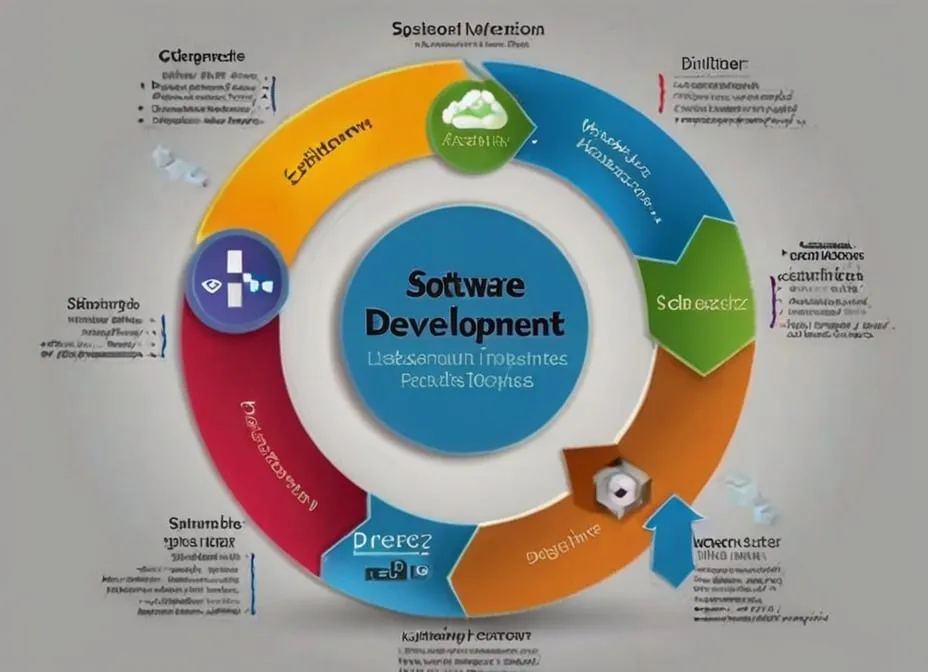What is a Tech Career?
I. Understanding Tech Careers

A. Definition of a Tech Career
In the digital age, a tech career encompasses a wide range of professions that involve designing, developing, implementing, and maintaining technology-related products, services, and systems. Tech careers are at the forefront of innovation, driving the advancement of various industries and shaping the way we live, work, and interact with the world around us.
B. Different Tech Career Paths
The tech industry offers a diverse array of career paths, each with its unique set of responsibilities and skill requirements. Some popular options include software development, data and analytics, cybersecurity, IT support and operations, and emerging fields like artificial intelligence (AI) and the Internet of Things (IoT).
C. Importance of Tech Careers in Today's World
Technology has become an integral part of our daily lives, revolutionizing industries and transforming the way we conduct business, communicate, and access information. As a result, tech careers have become increasingly crucial in driving innovation, enhancing efficiency, and solving complex problems across various sectors.
D. Myths and Misconceptions about Tech Careers
Despite their growing importance, tech careers are often shrouded in myths and misconceptions. Many people believe that tech careers are solely focused on coding or that they require advanced degrees in computer science. However, the reality is that the tech industry offers a diverse range of opportunities, catering to individuals with different skill sets, educational backgrounds, and interests.
II. Essential Skills for Tech Careers

A. Technical Skills
While specific technical skills may vary depending on the chosen career path, several core competencies are essential for success in the tech industry.
1. Programming Languages
Proficiency in programming languages like Python, Java, C++, or JavaScript is fundamental for many tech roles, particularly in software development, data science, and cybersecurity. Understanding programming concepts, syntax, and best practices is crucial for building robust and scalable applications.
2. Database Management
Knowledge of database management systems, such as SQL, NoSQL, and data modeling techniques, is essential for roles involving data storage, retrieval, and analysis. This includes positions in data analytics, business intelligence, and software development.
3. Cybersecurity
As cyber threats continue to rise, cybersecurity skills have become indispensable across various tech careers. Understanding principles of network security, cryptography, risk assessment, and incident response is vital for protecting digital assets and infrastructure.
4. Cloud Computing
With the increasing adoption of cloud-based services and infrastructure, proficiency in cloud computing platforms like AWS, Microsoft Azure, or Google Cloud Platform has become a valuable asset in the tech industry, enabling efficient and scalable deployment of applications and services.
B. Soft Skills
While technical skills are crucial, success in tech careers also hinges on possessing a strong set of soft skills that facilitate effective communication, collaboration, and problem-solving.
1. Problem-Solving
Tech professionals are often tasked with solving complex problems and developing innovative solutions. Strong analytical and critical thinking skills are essential for breaking down problems, identifying root causes, and developing effective strategies.
2. Communication
Effective communication skills are vital for conveying technical concepts to diverse audiences, collaborating with cross-functional teams, and presenting ideas or solutions clearly and concisely.
3. Teamwork
Tech projects often involve collaboration among team members with different skill sets and backgrounds. The ability to work effectively in a team environment, respect diverse perspectives, and contribute to a shared goal is paramount.
4. Adaptability
The tech industry is constantly evolving, with new technologies and trends emerging rapidly. Professionals in the tech field must be adaptable, embrace change, and continuously learn and upskill to stay relevant.
C. Continuous Learning and Upskilling
Given the ever-changing nature of technology, continuous learning and upskilling are essential for maintaining a competitive edge in tech careers.
1. Keeping Up with Technological Advancements
Staying up-to-date with the latest technological advancements, industry trends, and best practices is crucial for professionals in the tech field. This can involve reading industry publications, attending webinars, or participating in online communities.
2. Online Courses and Certifications
Online courses and certifications offered by reputable institutions, platforms, or technology companies can provide valuable opportunities for upskilling and acquiring new skills in specific areas of interest.
3. Attending Conferences and Workshops
Attending industry conferences, workshops, and meetups can facilitate networking with peers, exposing professionals to cutting-edge trends and innovations, and fostering knowledge-sharing within the tech community.
4. Networking with Industry Professionals
Building and maintaining a strong professional network can open doors to new opportunities, mentorship, and collaborations. Engaging with industry professionals can provide valuable insights, advice, and perspectives on navigating tech careers.
III. Exploring Popular Tech Career Options

A. Software Development
Software development encompasses a broad range of roles focused on designing, building, testing, and maintaining software applications and systems.
1. Web Development
Web developers create and maintain websites and web applications, ensuring seamless user experiences across various devices and platforms. This includes front-end development (HTML, CSS, JavaScript) and back-end development (server-side programming, databases).
2. Mobile App Development
Mobile app developers create applications for smartphones, tablets, and other mobile devices, leveraging programming languages and frameworks like Swift (iOS), Kotlin/Java (Android), or cross-platform tools like React Native.
3. Game Development
Game developers design and build interactive gaming experiences for various platforms, including consoles, mobile devices, and personal computers. This involves skills in game design, programming, graphics, and multimedia development.
4. Software Engineering
Software engineers apply engineering principles and methodologies to design, develop, and maintain complex software systems. They focus on software architecture, performance optimization, and ensuring the overall quality and reliability of software products.
B. Data and Analytics
In the era of big data, professionals in data and analytics play a crucial role in extracting insights from vast amounts of information to drive informed decision-making.
1. Data Science
Data scientists combine expertise in programming, statistics, and machine learning to analyze and interpret complex datasets, uncover patterns and trends, and develop predictive models to solve real-world problems.
2. Data Analytics
Data analysts collect, process, and analyze data to transform raw information into meaningful insights, visualizations, and reports that support business decision-making processes.
3. Business Intelligence
Business intelligence (BI) professionals leverage tools and technologies to transform data into actionable insights, enabling organizations to make data-driven decisions and gain a competitive advantage.
4. Machine Learning
Machine learning engineers and researchers develop and deploy algorithms and models that enable systems to learn and improve from data, without being explicitly programmed. This field is at the forefront of artificial intelligence and has applications across various industries.
C. Cybersecurity
As digital threats continue to evolve, cybersecurity professionals play a critical role in protecting organizations' digital assets, networks, and systems from unauthorized access, data breaches, and cyber-attacks.
1. Ethical Hacking
Ethical hackers, also known as penetration testers or white hat hackers, use their skills to identify and exploit vulnerabilities in computer systems and networks, to strengthen security measures and prevent potential breaches.
2. Network Security
Network security professionals are responsible for designing, implementing, and maintaining secure network infrastructures, including firewalls, intrusion detection systems, and virtual private networks (VPNs), to protect against unauthorized access and cyber threats.
3. Cloud Security
Cloud security specialists ensure the security and compliance of cloud-based systems, applications, and data by implementing security controls, monitoring for threats, and maintaining secure configurations in cloud environments.
4. Information Security Analyst
Information security analysts are responsible for assessing and mitigating security risks, developing and implementing security policies and procedures, and responding to security incidents within an organization.
D. IT Support and Operations
IT support and operations professionals play a vital role in maintaining and optimizing the technology infrastructure and systems that enable organizations to function effectively.
1. IT Support Specialist
IT support specialists provide technical assistance and troubleshooting for hardware, software, and network issues, ensuring that end-users can effectively utilize technology resources.
2. Systems Administrator
Systems administrators are responsible for managing and maintaining computer systems, servers, and network infrastructure, ensuring efficient operation, security, and performance.
3. Network Administrator
Network administrators design, configure, and maintain local area networks (LANs), wide area networks (WANs), and related network services, ensuring reliable connectivity and optimal performance.
4. DevOps Engineer
DevOps engineers bridge the gap between software development and IT operations, automating processes, and implementing tools and methodologies to streamline the software development lifecycle, enabling faster and more reliable software delivery.
IV. Building a Successful Tech Career

A. Education and Training
While there are multiple paths to a tech career, obtaining the right education and training is crucial for developing the necessary skills and knowledge.
1. Traditional College Degrees
Many tech professionals pursue traditional four-year college degrees in fields such as computer science, information technology, or computer engineering. These programs provide a strong foundation in theoretical concepts, programming languages, and problem-solving skills.
2. Bootcamps and Coding Schools
Coding boot camps and intensive training programs have gained popularity as an alternative to traditional education, offering accelerated and hands-on learning experiences tailored to specific tech roles, such as web development, data science, or cybersecurity.
3. Self-Study and Online Resources
With the abundance of online resources, self-study has become a viable option for those seeking to enter the tech field or upskill in specific areas. Online courses, tutorials, and coding platforms like Coursera, Udemy, and FreeCodeCamp offer flexible and affordable learning opportunities.
4. Internships and Entry-Level Positions
Internships and entry-level positions provide valuable on-the-job training and real-world experience, allowing individuals to apply their knowledge and skills in a professional setting while learning from experienced professionals.
B. Job Search Strategies
Securing a tech job can be competitive, and having an effective job search strategy is crucial for standing out in the job market.
1. Creating a Compelling Resume and Portfolio
A well-crafted resume that highlights relevant skills, projects, and accomplishments is essential for catching the attention of potential employers. Additionally, maintaining an online portfolio showcasing personal or professional projects can demonstrate practical skills and expertise.
2. Networking and Job Fairs
Attending industry events, job fairs, and networking events can open doors to new opportunities and connections. Building relationships with professionals in the field can lead to job referrals, mentorship, and valuable industry insights.
3. Online Job Boards and Company Websites
Regularly checking online job boards, company career pages, and professional networking platforms like LinkedIn can provide access to a wide range of tech job opportunities and allow for targeted job searches based on specific criteria.
4. Interviewing Techniques
Effective interviewing techniques, such as preparing for common technical and behavioral questions, practicing coding challenges or case studies, and demonstrating strong communication skills, can significantly improve the chances of landing a desired tech job.
C. Career Advancement and Growth
As technology continues to evolve rapidly, professionals in the tech industry must continuously seek opportunities for career advancement and growth to stay relevant and competitive.
1. Specialization and Certification
Pursuing specializations or obtaining industry-recognized certifications in specific areas of expertise can differentiate individuals from their peers and demonstrate a deep level of knowledge and commitment to their chosen field.
2. Leadership and Management Roles
For those seeking career growth, transitioning into leadership or management roles can open up new avenues for professional development. These roles often involve managing teams, overseeing projects, and driving strategic initiatives within an organization.
3. Entrepreneurship and Startups
The tech industry has a thriving entrepreneurial ecosystem, with many professionals choosing to launch their startups or ventures. This path allows for greater autonomy, creativity, and the potential for significant growth and impact.
4. Mentorship and Coaching
Serving as a mentor or coach to aspiring tech professionals can be a rewarding way to share knowledge and expertise while giving back to the community. This can also foster personal and professional growth through the exchange of ideas and experiences.
V. The Future of Tech Careers

A. Emerging Technologies and Trends
The tech industry is constantly evolving, with new technologies and trends emerging at a rapid pace, shaping the future of various industries and creating new career opportunities.
1. Artificial Intelligence and Machine Learning
Artificial Intelligence (AI) and Machine Learning (ML) are rapidly advancing fields that are transforming industries like healthcare, finance, and transportation. Professionals skilled in developing and deploying AI and ML models will be in high demand.
2. Internet of Things (IoT)
The Internet of Things (IoT) refers to the interconnected network of physical devices, vehicles, home appliances, and other items embedded with sensors, software, and network connectivity. IoT careers will involve developing and managing these connected systems and analyzing the data they generate.
3. Blockchain and Cryptocurrency
Blockchain technology and cryptocurrencies like Bitcoin have revolutionized the financial and digital sectors, creating new opportunities in areas such as decentralized finance (DeFi), smart contracts, and secure digital transactions.
4. Virtual and Augmented Reality
Virtual Reality (VR) and Augmented Reality (AR) are rapidly advancing technologies with applications in gaming, entertainment, education, and various industries. Careers in this field involve developing immersive VR/AR experiences, designing user interfaces, and creating 3D content and environments.
B. Impact of Automation and AI on Tech Careers
The rise of automation and artificial intelligence has sparked debates about their potential impact on the workforce, including tech careers.
1. Job Displacement and New Opportunities
While automation and AI may lead to the displacement of certain jobs, they also create new opportunities in areas such as developing and managing these technologies, data analysis, and specialized roles that require human expertise and creativity.
2. Reskilling and Upskilling Workforce
As automation and AI continue to reshape industries, reskilling and upskilling the workforce will be crucial to ensure that professionals can adapt and thrive in the changing job market.
3. Human-Machine Collaboration
Rather than replacing human workers entirely, the future may involve a symbiotic relationship between humans and machines, where AI and automation augment and enhance human capabilities, leading to increased productivity and efficiency.
4. Ethical Considerations
The widespread adoption of AI and automation also raises ethical concerns regarding privacy, bias, and accountability. Professionals in the tech industry will need to navigate these ethical considerations and ensure the responsible development and deployment of these technologies.
C. Embracing Change and Adaptability
In the ever-evolving tech landscape, embracing change and cultivating adaptability are essential for professionals to remain relevant and successful in their careers.
1. Developing a Growth Mindset
Adopting a growth mindset, which involves embracing challenges, learning from failures, and continuously seeking opportunities for personal and professional development, is crucial for thriving in the dynamic tech industry.
2. Embracing Lifelong Learning
Technology is constantly advancing, and staying up-to-date with the latest trends, tools, and best practices requires a commitment to lifelong learning. Professionals should be proactive in expanding their knowledge and skills through various channels, such as online courses, workshops, and industry events.
3. Fostering Innovation and Creativity
The tech industry rewards innovation and creativity. Professionals should cultivate an entrepreneurial mindset, think outside the box, and explore new ways to solve problems or improve existing solutions. Encouraging a culture of experimentation and continuous improvement can lead to groundbreaking ideas and innovations.
4. Staying Relevant in the Tech Industry
To remain relevant in the tech industry, professionals must be willing to adapt to changing market demands, emerging technologies, and evolving business models. This may involve transitioning to new roles, acquiring new skills, or even exploring different industries that leverage technology in innovative ways.
FAQs
What qualifications do I need for a tech career? The qualifications for tech careers can vary depending on the specific role and industry. While a bachelor's degree in computer science, information technology, or a related field is common, alternative paths like coding boot camps, online courses, and self-study are also viable options. Many employers value practical skills, problem-solving abilities, and a willingness to learn over formal qualifications.
Can I transition into a tech career without a technical background? Yes, it is possible to transition into a tech career without a technical background. Many individuals have successfully made career changes in the tech industry by acquiring relevant skills through self-study, online courses, boot camps, or entry-level positions. The key is to demonstrate a strong aptitude for learning, problem-solving, and a genuine interest in technology.
What are the most in-demand tech careers? Some of the most in-demand tech careers currently include software development (particularly in areas like web development, mobile app development, and cloud computing), data science and analytics, cybersecurity, artificial intelligence and machine learning, and DevOps engineering. However, demand can vary depending on industry trends and regional markets.
How can I stay up-to-date with the latest technologies and trends? Staying up-to-date with the latest technologies and trends in the tech industry requires a commitment to continuous learning. Some effective strategies include attending industry events and conferences, participating in online communities and forums, following thought leaders and influencers in your field, and completing online courses or certifications related to emerging technologies.
What are the biggest challenges in pursuing a tech career? Some of the biggest challenges in pursuing a tech career include the rapid pace of technological change, the need for continuous learning and upskilling, the competitive job market, and the constant pressure to stay up-to-date with the latest tools and technologies. Additionally, tech careers often require strong problem-solving skills, attention to detail, and the ability to work collaboratively in team environments.










